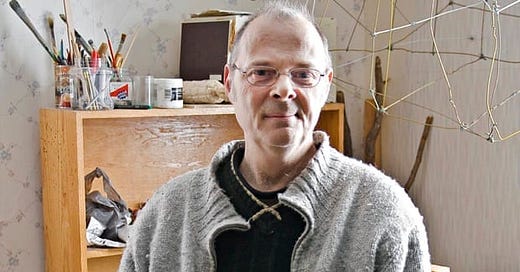Peter died, on this day in the before times, thirteen years ago. He was my older brother, my friend and sometimes even my rival. As deaths go, Peter had a shit ending at the early age of fifty. He died literally like a fish out of water because his lungs were so diseased from pulmonary fibrosis that even an artificial respirator couldn’t give him the air he needed to breathe. It was a bad ending for someone who drew so many short straws from life because mental illness was his constant adult companion. To be clear mental illness didn’t stop him from living a life with many moments of wonder, joy, laughter, and love in it.
In an email to a colleague shortly before his death, Peter wrote:
"What are our stories? I am neither pessimistic nor positive. I do think things will be lost, and things will be found. We will change, and our nature will change us. We wake at times to our oneness, along with the feeling that we are also part of something infinitely larger than ourselves. I would have to say the time I had with its good and its bad was a fucking blast."
Peter, unlike many of us, was able to define the experiences that shaped his life because he was a visual artist. In that way, he was lucky because to the great majority, life is a linear progression where we acquire not wisdom but material comforts and joys that we display to others as if they were our core, our essence and our souls. To Peter, living was a whimsical odyssey towards discovering your true self.
But mental illness did exact a heavy toll on him and all those who loved him. Were it not for schizophrenia, Peter would have had a more conventional life, rather than the one he had living, for over a decade in exile from his generation at our parents’ house. My parents kept him alive by denying themselves a life which is the role of all caregivers in broken societies. Being Peter’s caregiver took an enormous toll on my parents because they were already in their 60s when he became severely ill. It ended all their hopes and dreams for a retirement spent in productive leisure after beginning their lives in the harsh extremes of the Great Depression and the Second World War.
Despite the myth, neo-liberals tell today of the good old days of the 1990s, my parents had no government support to take care of Peter. What Reagan, Thatcher and Mulroney hadn't obliterated of the Welfare State in the 1980s, Clinton, Blair, Chretien and a host of Canadian premiers pounded away at it in the 1990s. When Peter was diagnosed with schizophrenia in 1991, there was nothing left but family support to keep him alive. It tapped out much of their savings which they had squirrelled away for their own rainy days.
My parents admirably performed the role of caregiver to Peter, but they paid a heavy price because caregiving shortened my mother's life. When my brother’s psychosis made him speak in tongues and turn every picture or painting in my parents’ house to face the wall because they told him to kill himself, my mother was battling her own ailments like rheumatoid arthritis. It left her an invalid and required many stays in the hospital. In later life, my mother was plagued by physical infirmities because the stress of being a caregiver made her ignore her own needs, She developed shingles and then, after a series of silent heart attacks whose symptoms were ignored by her doctors, was rushed to hospital for a quadruple bypass operation. My mother survived all that before dying of cancer, which despite causing intense physical pain, went undiagnosed until three days before she died on July 2nd, 1999.
On her deathbed, my mum was provided with some grace to make her dying easier. She was allowed to believe her self-sacrifice produced the potential for a happy ending to Peter's life because my brother married his long-time girlfriend a month before she died.
But life is more Chekhov than Jane Austin because- although Peter, after my mum’s death was afforded a more independent life owing to a change in his medications, it was short-lived. The wonder drugs that alleviated and lessened the symptoms of his schizophrenia are also believed to have encouraged his lungs to become fibrotic, killing him in the shittiest of ways when he was on the cusp of artistic recognition and still a very young man.
On this day, thirteen years ago, when Peter died, my dad was 86 and furious that death had come for one of his boys rather than him, an old man. I was 46 then and knew for as long as my dad was alive, it was my responsibility to ensure that the remainder of his life had the same care, love, and compassion as he had given to Peter and my mother as their caregivers. From 2009 until 2018, I took care of my father the best way I knew by making him the World’s Oldest Rebel. It was my way of remembering and honouring Peter and our mum. Or to paraphrase Humphrey Bogart in Casablanca- their lives should add up to more than a hill of beans in this crazy world.
As always, thank you for reading because I really need your help this month. Your subscriptions to Harry’s Last Stand keep the legacy of Harry Leslie Smith alive and me housed. This month is proving to be real scramble to get next months together. So if you can join with a paid subscription which is just 3.50 a month or a yearly subscription or a gift subscription. I promise the content is good, relevant and thoughtful. Take Care, John



